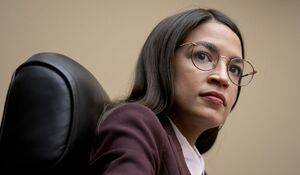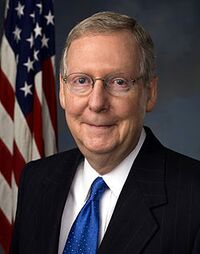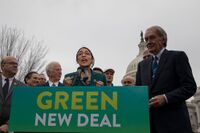Green New Deal

The Green New Deal was a governing plan submitted by celebrity freshman Congresswoman Alexandria Ocasio-Cortez ("AOC") and other members of her "squad" to transform the United States and achieve climate justice, social justice, racial justice, and justice for the fat and slovenly. It was a plan that was "good for what ails you," provided you spend a lot of time complaining about ailments.
Etymology[edit]
The Green New Deal was named after the New Deal of President Franklin Delano Roosevelt. Both were called a new deal because it is a crucial unwritten power of the U.S. President (not to mention a gaggle of newly elected Representatives) to call all the cards (here meaning: worldly possessions) back into the deck and re-deal them, following a fitful shuffling, during which no one will petition the government for redress of grievances and thereby obtain more than his share.
The original New Deal was followed by a Square Deal, a Fair Deal, a Raw Deal for Democrats following Bill Clinton's first midterm election, and by the time of President Donald Trump, a No Big Deal.
History[edit]
Throughout the 1970s and 1990s, activists sought to move America away from having cities lit up every night, and toward having cities lit up mostly when there had been bright sunshine that day or a stiff wind. (In the 1980s, America took a break from this and made some serious spending cash.) Thomas Friedman was an early user of the term Green New Deal (having rejected the term Renewable World War II). He wrote about moving America away from dirty oil toward clean coal "if we undertake a green verson [of the] New Deal."
Britain's Green New Deal Group took up the approach in 2008. It also gave rise to the band Green Day, the city of Green Bay, and its football team, the Green Machine. Eventually, the United Nations saw that a Green New Deal was an excellent opportunity to get some cards up its own sleeve.
Jill Stein of the Green Party ran in 2012 on a version of the Green New Deal, as did Lorne Greene of the Bonanza Party in 2016.
The 116th Congress[edit]
In 2018, President Donald Trump announced that he had completed all his campaign promises. This comprised a nifty new business tax cut, plus dozens of easily scaled billboards showing pictures of walls, plus non-working "security cameras," at notorious crossing points of the border with Mexico. Meanwhile, opposition Democrats had not even done that much, mainly accusing Supreme Court nominee Brett Kavanaugh of running a high school rape gang that drugged and victimized college girls in nearby cities who kept coming back for more. It was evident that Tip O'Neill's maxim that "all politics is local" would be back in vogue.
There being 435 seats in the House, all of them up for coin-flip every two years, the renewed local emphasis meant that a few crazies would sneak in again. Notably, several old, pasty-white urban Congressmen with penthouses in Georgetown who had not been back "home" since the Interstates were built were vulnerable. Of course, they did not even know that. Consequently, Alexandria Ocasio-Cortez snared a seat on the Bronx/Queens border of New York City from Joe Crowley, while Ayanna Pressley knocked off Mike Capuano in Boston. The two reached all the way across the left wing of the Democratic Party to join forces with two sudden new Muslim Congresswomen, Ilhan Omar of Minneapolis and Rashida Tlaib of Detroit and the race was on, as Rush Limbaugh says of the U.S. military, to "break things and kill people."
In the U.S. Senate, they were joined by Ed Markey, a politician of the same vintage as Crowley and Capuano whose collar was feeling particularly tight since the 2018 election. A little birdie told him, "You can't beat them so you had better join them."
The Representatives filed House Resolution 109, while Markey sponsored Senate Resolution 59. An early setback was that Senate leader Mitch McConnell tricked the Democrats by putting the damned thing to a vote. Markey and all other Democrats claimed they had called for an Uber to the Capitol but mistakenly called up a rap playlist on their phones. The initial vote was 0-57 against, signaling that the Green New Deal would see no light in the 116th Congress and would have to itself undergo recycling into campaign platforms for the 2020 election.
What is in it[edit]
The Green New Deal as filed in the House and the Senate is a 14-page resolution, incorporating many initiatives by which America will fight the scourge of man-caused, runaway climate change through massive bureaucracy. Important points provide that:
- Government will force prices to change, to include the "social cost" of not doing things in a way that suits me. One thing Ocasio-Cortez took from her major in Economic Grievance Studies at Boston University is that any inconvenience to shoppers merely reflects the cost of paying for their "externalities."
- People will be guaranteed a wage; not just a "minimum wage" but a "living wage®" so that everything is affordable, affordability being measured in post-Budweiser-thirty-pack dollars.
- Everyone also gets free health care, housing, education, and food, and that doesn't mean hamburgers (as we will have killed all the cows because they fart all the time), but good curry (no comment).
- Everyone also gets a job, with ample fringes such as paid leave for dog bereavement, and without pressure to do actual work. (A former declaration guaranteeing income to "those unwilling to work" has been deleted from Ocasio-Cortez's web page, as sponsors concluded there was already plenty of that going on in federal office buildings.)
In summary, we are going to Save The Planet® by implementing the entire leftie agenda, though we somehow never did so when the goal was merely to win the next election (which, incidentally, it still is).
Controversy[edit]
The Green New Deal has attracted controversy from both the right and the left. The left complains that, despite heady rhetoric, the Green New Deal will leave Americans free to shop and to compare prices, which means they might not do the right thing. The Republican Party, for its part, complains that the Green New Deal, if it were to be rebutted, would require the power of persuasion, which is inherently unfair. The Firesign Theatre, in its manifesto, Don't Crush That Dwarf, Hand Me The Pliers, stated that the Green New Deal and its guarantee of millions of new "green" jobs, would result in "harder work for everyone, and more of it too."

